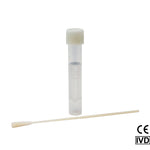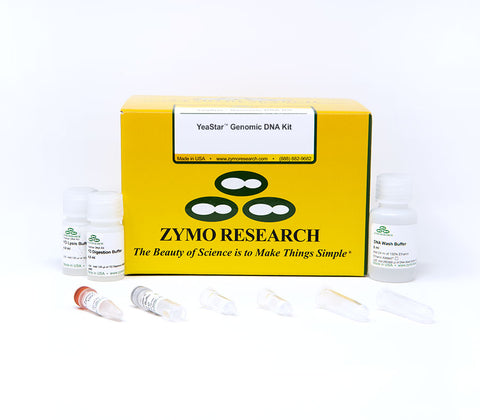Successfully Added to Cart
Customers also bought...
-
 DNA/RNA Shield (50 ml)Cat#: R1100-50DNA/RNA Shield reagent is a DNA and RNA stabilization solution for nucleic acids in any biological sample. This DNA and RNA stabilization solution preserves the...
DNA/RNA Shield (50 ml)Cat#: R1100-50DNA/RNA Shield reagent is a DNA and RNA stabilization solution for nucleic acids in any biological sample. This DNA and RNA stabilization solution preserves the... -
 DNA/RNA Shield SafeCollect Swab Collection Kit, 1ml (1 collection kit)Cat#: R1160The DNA/RNA Shield SafeCollect Swab Collection Kit is a user-friendly collection kit for stabilizing the nucleic acid content of samples collected with a swab. DNA/RNA Shield completely inactivates harmful pathogens...
DNA/RNA Shield SafeCollect Swab Collection Kit, 1ml (1 collection kit)Cat#: R1160The DNA/RNA Shield SafeCollect Swab Collection Kit is a user-friendly collection kit for stabilizing the nucleic acid content of samples collected with a swab. DNA/RNA Shield completely inactivates harmful pathogens...
YeaStar Genomic DNA Kit
| Cat # | Name | Size | Price | Quantity |
|---|
Highlights
- Simple: Fast spin-column procedure yields pure yeast genomic DNA without using glass beads or phenol.
- Versatile: Efficient DNA isolation from a broad spectrum of fungal species susceptible to Zymolyase.
- High-Quality: Isolated genomic DNA is ready for Southern blotting, PCR, restriction enzyme digestions, etc.
Documents
Product Description
Technical Specifications
| Applicable For | Isolated DNA is well suited for downstream applications such as Southern blotting, PCR, restriction endonuclease digestion, Next-Generation Sequencing and other sensitive applications. |
|---|---|
| Elution Volume | ≥ 60 µl TE or DNase-free Water |
| Equipment | Microcentrifuge, heat block/bath |
| Processing Time | 1.5 hours |
| Processing Volume | ≤ 1.5 ml of Culture (1-5 x 107 cells) |
| Purity | Typical A260/A280 & A260/A230 ≥ 1.8 |
| Sample Source | Cell Culture (Colonies/Patches or Liquid Culture) |
| Size Range | Capable of recovering 35-60 kb sized fragments of genomic and mitochondrial DNA. |
| Type | Total DNA |
| Yield | ≤ 25 µg of total DNA |
Resources
Q1: What is the difference between protocol I and protocol II?
Protocol I and II are almost same, except that chloroform is used in Protocol I. Protocol I usually gives more recovery of DNA by 30-80% compared to Protocol II. Protocol II is chloroform-free. Chloroform is not provided.
Q2: What strains is this kit compatible with?
Any strains susceptible to Zymolyase, which includes the following fungal genera: Asbya, Kloekera, Candida, Kluyveromyces, Debaryomyces, Lipomyces, Eremothecium, Metschikowia, Endomyces, Pichia, Hansenula, Pullularia, Hanseniaspora, Saccharomyces, Saccaromycodes, Saccharomycopsis, Schizosaccahromyces, Torulopsis
Q3: How can I improve my DNA yield?
Zymolyase is very efficient, but here are some tips to maximize DNA yield. 1. Use fresh and early log phase cells, which are more susceptible to the lytic properties of Zymolyase. 2. Using less cells as input can improve overall lysis efficiency. 3. Zymolyase digestion time can also be increased to 2 – 16 hours.
| Cat # | Name | Size | Price | |
|---|---|---|---|---|
| D2002-1 | YD Digestion Buffer | 4.8 ml | $21.00 | |
| D2002-2 | YD Lysis Buffer | 4.8 ml | $36.20 | |
| D4003-2-6 | DNA Wash Buffer (Concentrate) | 6 ml | $11.60 | |
Need help? Contact Us


